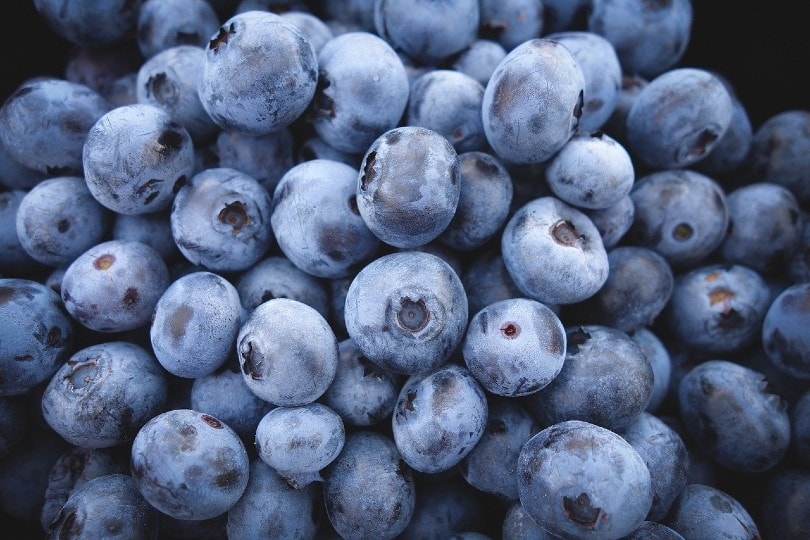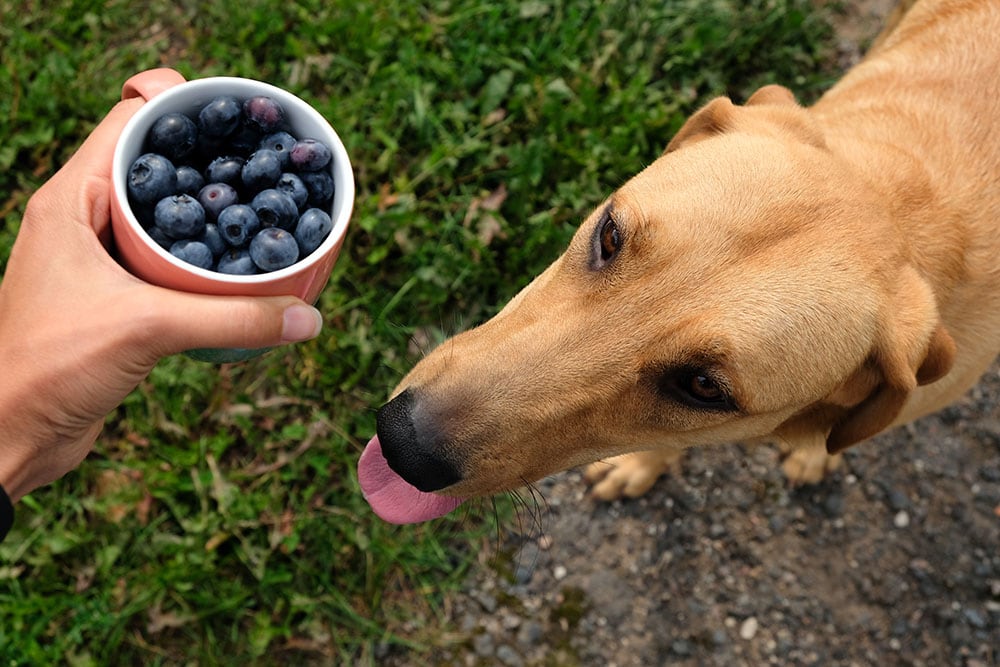Many fruits are completely dog friendly and are even put into commercial dog food recipes to enhance nutrition. Still, it’s always best to check the safety of certain plant-based foods before you offer them to your pet.
So, are blueberries safe for dogs? Absolutely, blueberries are safe for dogs, and they pack a punch of vitamins and minerals in one tiny package. Let’s find out what this superfood does for our canine companions.
Dogs Can Eat Blueberries
Blueberries are packed with nutrients that will significantly benefit your dog’s body. They have antioxidant power that protects the cells from free radical damage and reduces certain health risks.
Blueberries are also small and easy to chew. Even with giant blueberries, you won’t have to worry about these fruits posing any choking hazard (though you should still monitor your dog while they’re eating, just in case). They are soft enough for puppies and seniors to munch on without issue.

A Little About Blueberries
Blueberries are cultivated all over North America. Like many other berries, blueberries grow on small shrubs. Blueberry bushes are closely related to cranberries and huckleberries but trump them in terms of health.
There are two main kinds of blueberry: highbush and lowbush. Highbush is the type that you might see in the grocery store or farmers’ market. They are big, bulbous, and dark. Lowbush blueberries are found in the wild. They might be smaller, but they are even higher in nutritional content.
Blueberries serve as a food source for critters everywhere and are used in a variety of different food items, even dog food.
Blueberry Nutrition Facts
- Calories: 57
- Water: 84%
- Protein: .7 g
- Carbohydrates: 14 g
- Sugar: 10 g
- Fiber: 2.4 g
- Vitamin K: Helps with blood clotting and bone health
- Vitamin C: Boosts immunity and provides joint support
- Manganese: Aids in tissue, bone, blood, and metabolic support
Why Are Blueberries a Superfood?
Although there is no scientifically regulated definition, “superfood” is a term used to define a natural ingredient that is rich in nutrients and has properties that are linked to the prevention of disease. Blueberries are considered a superfood because they are low in calories, full of nutrition, and super beneficial to the body.
- Blueberries are low in calories but high in nutrition.
- They reduce DNA damage.
- Blueberries strengthen the immune system.
- They fight against diseases, like cancer.
- Blueberries have anti-aging properties.
- They improve cognitive response.
These delicious semi-sweet berries really do their part in terms of providing nutrients!

What Are Antioxidants?
Antioxidants are compounds found in many fruits and vegetables that reduce cell damage by reducing free radical oxidative effects.
Do Dogs Like Blueberries?
Whether your dog likes blueberries depends on them. Some dogs might act overly interested. Other dogs might take a sniff and look up at you, wondering if you have a steak hidden behind your back instead.
The only test is to offer your dog a blueberry and see if they eat it. Even if they do, it’s best not to give them too many blueberries at once, since the fruits could cause diarrhea. You can start by offering a few on top of your dog’s regular kibble a few times a week.

Using Blueberries for Training
Most dogs are food motivated, so when it’s time to train your pup, instead of using commercial dog treats that can be high in calories, carbs, and fat, you can use blueberries instead. Blueberries are the perfect size for a quick reward. One is enough to give your dog a sweet tasty surprise to motivate them toward the behavior.
If you’re training a puppy, feeding them treats like blueberries can also channel their taste buds to crave healthier foods rather than commercial treats or table scraps.
Serving Blueberries in Moderation
Since blueberries are just one fraction of the nutrition that your dog needs in their diet, make sure to feed them sparingly. Too many blueberries might cause diarrhea or gastrointestinal upset. Just a few are perfect for your dog to enjoy.
On the upside, blueberries don’t have as much sugar content as some other fruits. So, even though you still have to be mindful of your dog’s sugar intake, this little berry is a good pick.
PangoVet. It’s an online service where you can <b>talk to a vet online</b> and get the personalized advice you need for your pet — all at an affordable price!
</p>
<div class="su-button-center"><a href=https://www.dogster.com/dog-nutrition/"https://pangovet.com/?utm_source=dogster&utm_medium=article&utm_campaign=dog_eat_drink%22 class="su-button su-button-style-default" style="color:#FFFFFF;background-color:#FF6600;border-color:#cc5200;border-radius:9px;-moz-border-radius:9px;-webkit-border-radius:9px" target="_blank" rel="nofollow"><span style="color:#FFFFFF;padding:0px 24px;font-size:18px;line-height:36px;border-color:#ff944d;border-radius:9px;-moz-border-radius:9px;-webkit-border-radius:9px;text-shadow:none;-moz-text-shadow:none;-webkit-text-shadow:none"> Click to Speak With a Vet</span></a></div></div></div>"}" data-sheets-userformat="{"2":513,"3":{"1":0},"12":0}"> If you need to speak with a vet but can’t get to one, head over to PangoVet. It’s an online service where you can talk to a vet online and get the personalized advice you need for your pet — all at an affordable price!

Final Thoughts
From commercial food to homemade treats, many brands and owners rely on the power of blueberries to aid in overall dog health. Blueberries are perfectly safe and nutritious canine snacks. You can feed your dog a small handful or even add a few to their food bowl at mealtimes.
Blueberries are also a fantastic motivator if you use them as treats during training. Overall, this little superfood gets a 10 out of 10 for being such a powerful fruit for our pups!












